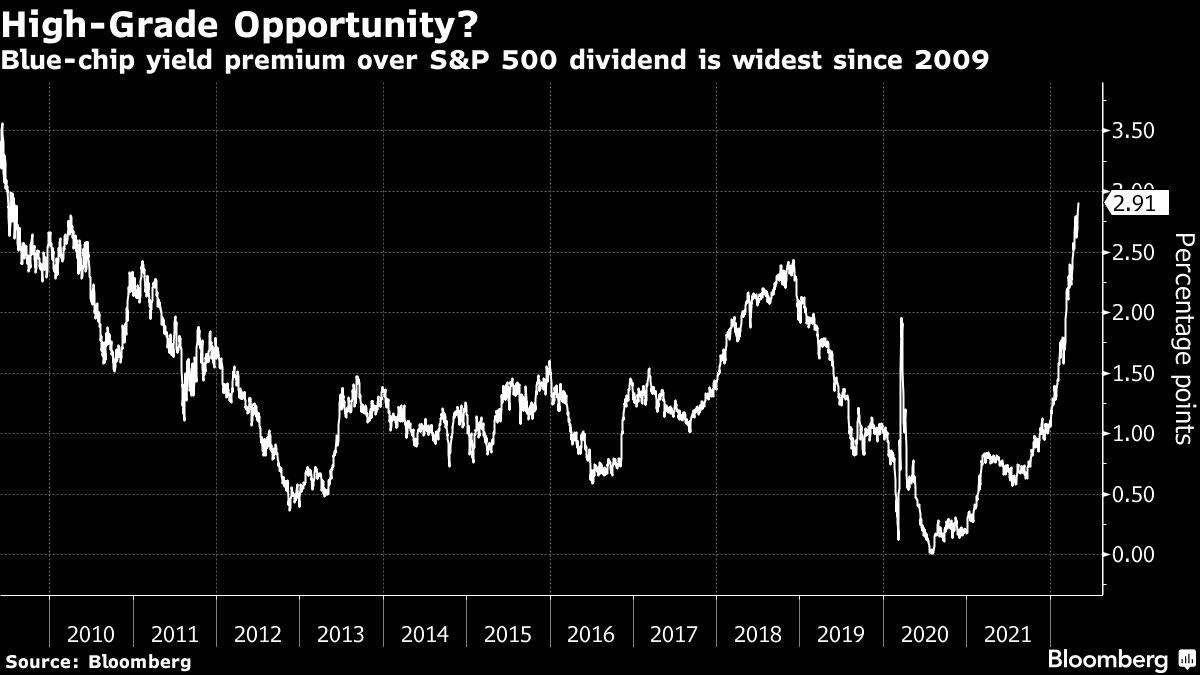Fearful Investors Should Buy Credit, Sell Stocks, JPMorgan Says

(Bloomberg) — Investors looking to protect themselves against more market turmoil should think about selling some blue chip companies’ shares and buying the corporations’ bonds instead, according to JPMorgan Chase & Co.
Most Read from Bloomberg
Such trades can generate more income for investors: yields on investment-grade corporate notes averaged 4.4% as of Monday’s close, according to Bloomberg index data, compared with the S&P 500 average dividend yield of about 1.5%. The current gap between the two yields, of about 2.9 percentage points, is the widest since 2009.
When debt yields were lower, some bond investors looked at buying equities with relatively high dividend yields, to earn income while also potentially generating gains from shares getting more valuable. Now it might make sense to consider the opposite trade: earning higher yields on bonds and getting the downside protection the debt securities can offer, JPMorgan strategists wrote in a note on Tuesday.
“By rotating an equity that has outperformed to a fixed-income security on the other side, you are locking in that yield until the maturity of the security,” Nathaniel Rosenbaum, JPMorgan U.S. high grade strategy analyst, said in a phone interview on Tuesday.
JPMorgan strategists said that the bank remains positive on both investment-grade risk premiums and equities now, but added that some investors are looking to protect their downside. The Federal Reserve started hiking rates in March for the first time since 2018 as it tries to get inflation under control. U.S. equities have lost 12.4% this year through Monday’s close after accounting for dividends.
JPMorgan listed a series of potential trades for investors to consider, screening for equities that had gained so far this year, a sign that they may have less upside if the market broadly rebounded. It also looked for companies with relatively high dividend yields, at least 3%, and whose bonds yielded even more. Among the companies it lists are Public Service Enterprise Group Inc. and Kellogg Co.
Elsewhere in credit markets:
Americas
Two companies are selling investment grade bonds on Tuesday, after multiple companies stood down Monday and were expected to try again. Volatility has thwarted many potential issuers from selling new bonds over the last couple of weeks as syndicate desks work to help clients navigate through tumultuous swings in asset prices.
-
Investors continue to flock to the U.S. leveraged loan market, viewing the floating-rate product favorably in light of imminent rate hikes and white-hot inflation. Leveraged loans are outperforming most other asset classes so far this year
-
A group of banks led by Wells Fargo & Co. is discussing with investors potential changes for a struggling junk bond deal for medical device manufacturer Bioventus Inc. in a bid to draw more demand
-
For deal updates, click here for the New Issue Monitor
-
For more, click here for the Credit Daybook Americas
EMEA
Four issuers sold the equivalent of 6.15 billion euros ($6.48 billion) of bonds.
-
Russia appears to be sidestepping a default, as its closely watched dollar payments on two bonds are trickling through to investors
-
The U.K. should sell sustainability-linked bonds to show its commitment to net zero and do more to secure Britain’s place as the global center of green finance, think-tank Social Market Foundation said in a report
-
The pace at which companies are postponing financing plans is slowing as some reinstate deals shelved since Russia’s invasion of Ukraine
-
Global sales of sustainability-linked loans continue to lag last year’s record issuance as corporates steer away from new financing plans amid global inflation and Russia’s war in Ukraine.
Asia
Little action is likely in Asia’s debt markets this week, with a public holiday in Tokyo through Thursday and China also out today. Tuesday is also a public holiday in India, where investors are digesting the biggest monthly jump in top-rated corporate bond yields in more than a year.
Most Read from Bloomberg Businessweek
©2022 Bloomberg L.P.




